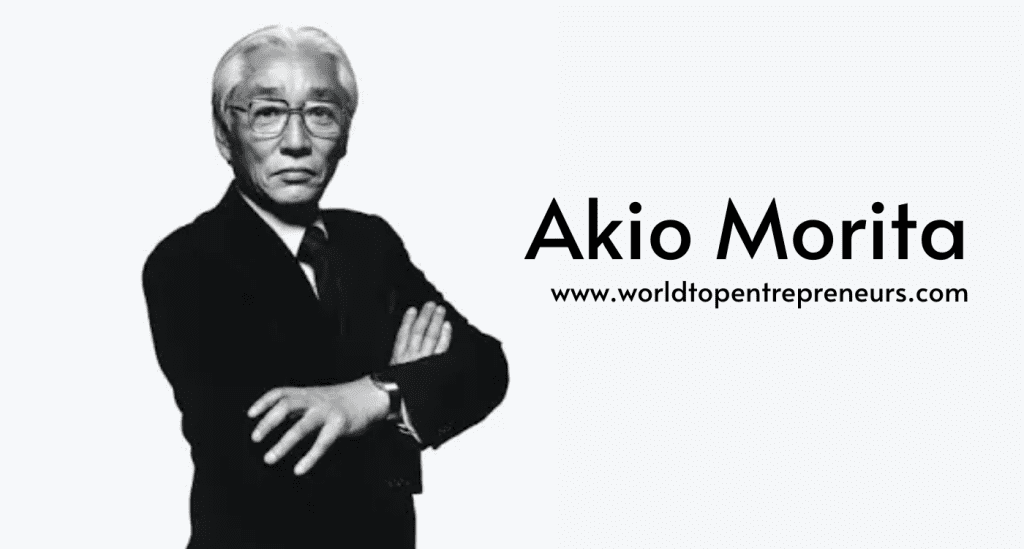In the annals of technological innovation and corporate leadership, Akio Morita stands out as a monumental figure whose vision and determination reshaped the world of electronics and entertainment. As a co-founder of Sony Corporation, Morita’s influence extended far beyond the creation of consumer electronics. His contributions have left an indelible mark on the technology landscape, transforming Sony from a small startup into a global powerhouse. This article delves into Morita’s life, his role in founding and expanding Sony, and his enduring impact on the world of technology and entertainment.
Early Life and Education
Akio Morita was born on January 26, 1921, in Nagoya, Japan, into a family of sake brewers. His early years were steeped in the traditions of his family business, but Morita’s aspirations extended beyond the realm of brewing. From a young age, he exhibited an aptitude for science and technology, driven by a curiosity that would later fuel his entrepreneurial spirit.
Morita pursued his higher education at Osaka Imperial University, where he studied physics. His academic journey was interrupted by World War II, during which he served in the Japanese Navy as a lieutenant. The war experience broadened Morita’s perspective, influencing his approach to business and technology in the years to come.
The Birth of Sony
After the war, Morita returned to Japan and, in 1946, co-founded Tokyo Tsushin Kogyo (Tokyo Telecommunications Engineering Corporation) with Masaru Ibuka. The company, later renamed Sony, was born out of a shared vision to build a new kind of electronics company that embraced innovation and quality.
Sony’s first significant breakthrough came with the development of Japan’s first transistor radio. In 1955, Sony introduced the TR-55, a compact and affordable radio that revolutionized the consumer electronics market. This innovation was a testament to Morita’s and Ibuka’s commitment to creating products that combined cutting-edge technology with practical design. The transistor radio not only marked Sony’s entry into the global market but also set the stage for future advancements in consumer electronics.
Breaking Barriers with Innovation
Under Morita’s leadership, Sony became synonymous with innovation. One of the most significant milestones in Sony’s history was the introduction of the first portable cassette player, the Walkman, in 1979. The Walkman was a game-changer, offering people the ability to carry their music with them in a way that had never been possible before. This revolutionary product epitomized Morita’s vision of creating technology that enhanced people’s lives by merging convenience with high quality.
The success of the Walkman established Sony as a leader in personal entertainment, but Morita’s ambitions went far beyond portable music players. In the 1980s, Sony made significant strides in the world of home electronics with the launch of the Betamax video cassette recorder (VCR). Despite the eventual dominance of the VHS format, the Betamax was a pioneering technology that laid the groundwork for future advancements in video recording and playback.
Morita’s forward-thinking approach extended to other areas of consumer electronics as well. Sony’s introduction of the first compact disc (CD) player in 1982, developed in collaboration with Philips, marked a significant leap in audio technology. The CD revolutionized the music industry, providing a new standard for audio quality and durability. This achievement was a testament to Morita’s belief in pushing technological boundaries and his dedication to creating products that set new industry standards.
Global Expansion and Corporate Philosophy
Morita’s vision for Sony was not confined to Japan. He recognized the importance of establishing a global presence and actively sought to expand Sony’s reach into international markets. In 1960, Sony opened its first overseas subsidiary in the United States, marking the beginning of a concerted effort to introduce Sony’s innovations to a global audience.
Morita’s approach to global business was characterized by a blend of cultural sensitivity and assertiveness. He understood the importance of adapting Sony’s products and marketing strategies to fit different cultural contexts while maintaining the company’s core values of innovation and quality. This approach allowed Sony to build a strong brand presence in diverse markets around the world.
A key element of Morita’s corporate philosophy was his emphasis on research and development. Sony’s commitment to R&D was driven by Morita’s belief that innovation was the key to staying ahead in the competitive electronics market. Under his leadership, Sony invested heavily in developing new technologies and products, fostering a culture of creativity and experimentation within the company.
Morita also championed the idea of “creative collaboration,” encouraging employees to work together across different departments and disciplines. This collaborative spirit was instrumental in driving Sony’s success and ensuring that the company’s innovations were not only groundbreaking but also practical and user-friendly.
The Sony Legacy and Cultural Impact
The impact of Akio Morita’s leadership extended far beyond the realm of technology. Sony’s innovations under Morita’s guidance had a profound effect on popular culture and the way people interacted with media. The Walkman, in particular, became a cultural icon, symbolizing the personal and portable nature of music in the modern age. It was more than just a product; it was a reflection of Morita’s vision of technology as a means of enhancing human experience.
Sony’s influence on the entertainment industry also cannot be overstated. The company’s ventures into film and television production, including the acquisition of Columbia Pictures in 1989, expanded its reach into the world of media and entertainment. This strategic move was part of Morita’s broader vision of integrating technology with content creation, paving the way for Sony’s continued success in the entertainment sector.
In addition to his contributions to technology and business, Morita was known for his dedication to social responsibility and philanthropy. He believed that corporations had a duty to contribute to the betterment of society, and Sony’s corporate social responsibility initiatives reflected this belief. Morita’s legacy includes not only his technological innovations but also his commitment to using business as a force for positive change.
Challenges and Transitions
Despite his many successes, Akio Morita’s tenure at Sony was not without challenges. The company faced numerous obstacles, including intense competition from other electronics manufacturers and shifts in consumer preferences. The transition from analog to digital technologies posed particular challenges, as Sony navigated the complexities of evolving markets and emerging technologies.
One of the significant challenges during Morita’s later years was the competition from new entrants in the electronics market. Companies like Apple and Samsung began to emerge as formidable competitors, introducing new technologies and products that challenged Sony’s dominance. Morita’s ability to adapt to these changes and guide Sony through periods of transition was a testament to his leadership and vision.
In 1999, Akio Morita retired from his role as Sony’s chairman, passing the baton to his successors. Although he stepped down from his formal position, his influence on the company and the industry continued to be felt. Morita’s legacy lived on through Sony’s continued innovation and success, as well as through the many employees and collaborators who were inspired by his vision and leadership.
Personal Reflections and Legacy
Akio Morita’s life and career are a testament to the power of vision, innovation, and perseverance. His journey from a young engineer to the co-founder of one of the world’s most influential electronics companies is a story of creativity and determination. Morita’s ability to foresee technological trends and his commitment to creating products that enhanced people’s lives set him apart as a visionary leader.
Reflecting on his career, Morita once remarked that his greatest satisfaction came from seeing Sony’s products make a positive impact on people’s lives. Whether through the Walkman, the compact disc, or other innovations, Morita’s work was driven by a desire to improve the way people experience technology and entertainment.
Akio Morita’s legacy is not just about the products Sony created but also about the philosophy and values that guided his work. His emphasis on innovation, quality, and social responsibility continues to influence the technology industry and serves as an inspiration to entrepreneurs and leaders around the world.
In conclusion, Akio Morita’s contributions to technology and entertainment are enduring and far-reaching. His vision and leadership transformed Sony from a small Japanese startup into a global leader in electronics and media. Morita’s impact extends beyond the products he helped create; it encompasses a broader vision of how technology can enhance human experience and drive positive change. As we look to the future of technology, Akio Morita’s legacy serves as a reminder of the power of innovation and the potential for technology to enrich our lives in profound ways.





















